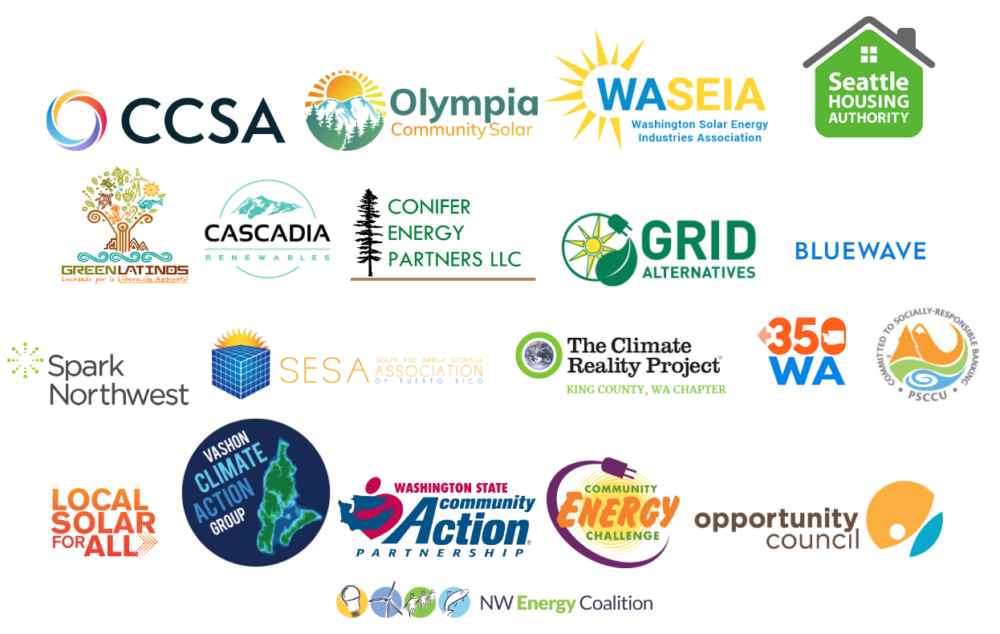
The Community Solar WA Coalition underlines the need for Washington to pass legislation this session on community solar
(Olympia, WA) — The Washington State House of Representatives Energy and Environment Committee today held a work session on solar energy policies for consideration. In light of this session, a broad coalition of supporters including solar companies, housing authority advocates, and environmental justice organizations announced the launch of the Community Solar WA Coalition.
The Coalition includes dozens of members that all align behind the need for Washington to expand equitable access to the benefits of clean, reliable, affordable, and locally sited solar power to all Washingtonians as part of a 100% clean energy strategy. In addition to Governor Jay Inslee’s continued campaign to confront climate change head on, The Fair Access to Community Solar Act is proposed state legislation with two key components that would advance these goals.
“As the author and introducer of the community solar bill, I could not be more excited about our state’s potential to address a myriad of climate, environmental justice, and energy goals this session,” said State Representative David Hackney. “We need all my fellow community solar voices across our state to stand together to ensure this happens.”
Conventionally, state community solar programs empower ratepayers with the choice to enroll as subscribers to a community solar project, which enables them to receive credits on their electricity bills based on their share of the project’s energy generation. With supportive policies, communities, municipalities, and states are seeing the benefits of community solar first-hand, and are capitalizing on the current federal programming from the Inflation Reduction Act to help kick start programs.
“I’m happy to stand by fellow community solar advocates today to continue educating Washingtonians about the benefits this source of clean energy has to offer them. Momentum has been building all year and we are excited to continue it with the resumption of the legislative session in January,” said Derek Chernow, Western Director at Coalition for Community Solar (CCSA).
In a state where approximately one-fifth of residents spend more than 10% of their income on energy-related expenses, both key provisions of the pending legislation would be welcomed by both households and local policymakers looking to reduce Washingtonians’ energy costs and ensure that the grid of the future is affordable and reliable.
First, the bill establishes a virtual net metering (VNM) program. This ensures that participants in a Washington community solar project (i.e. community solar subscribers) earn a credit on their monthly utility bill representing the value of their share of the project’s generated electricity.
“By establishing a virtual net metering program here in Washington, we can keep pace with other states that promote growth in their solar industries by expanding access to solar,” said Mason Rolph, President of Olympia Community Solar. “This will not only help small businesses, but also provide a key avenue for our state’s low-income residents to reap all the benefits community solar has to offer.”
Second, the bill requires that 50% of those subscribed to a community solar project be either a low-income ratepayer, or an organization providing services to low-income families, such as a qualifying nonprofit, tribal agency, or public agency, thus ensuring that bill savings are directed to Washington communities that need it most.
“Currently, millions of Washingtonians cannot access clean energy — whether due to inadequate housing or financial barriers,” said Kaitlin Borstelmann, Board President of the Washington Solar Energy Industries Association (WASEIA). “But with new community solar policy, solar companies around the state will for the first time be able to serve these residents and stimulate the state’s economy in the process.”
With up to $400 million available per applicant for the Environmental Protection Agency’s Solar for All (SFA) competitive grant program, the time is now for Washington state to establish its community solar program to take advantage of these and ensure fair access to clean energy.